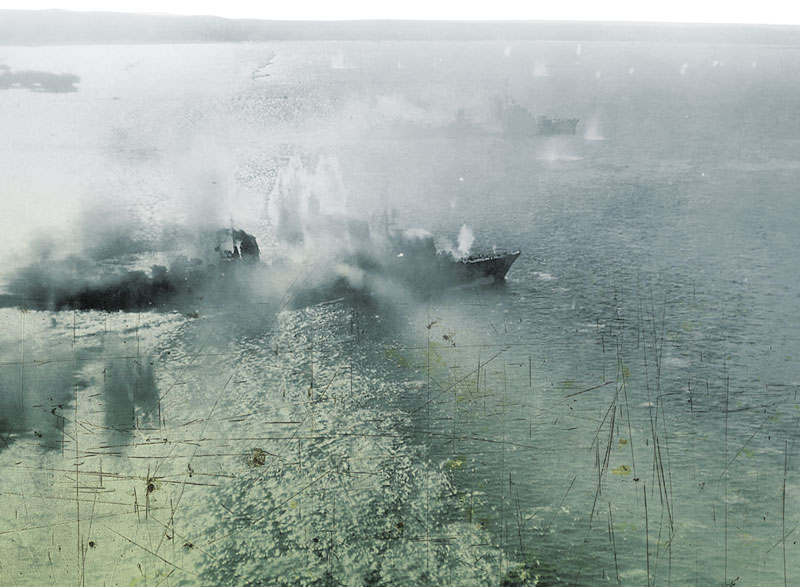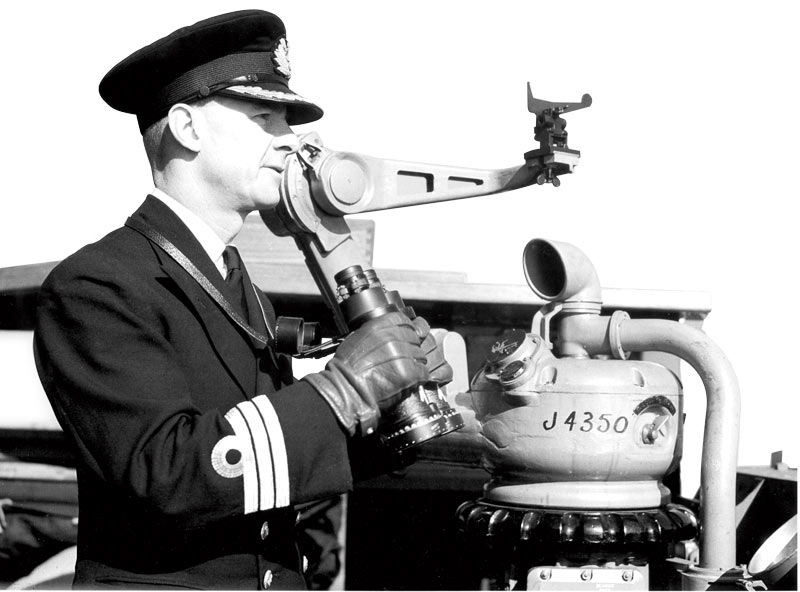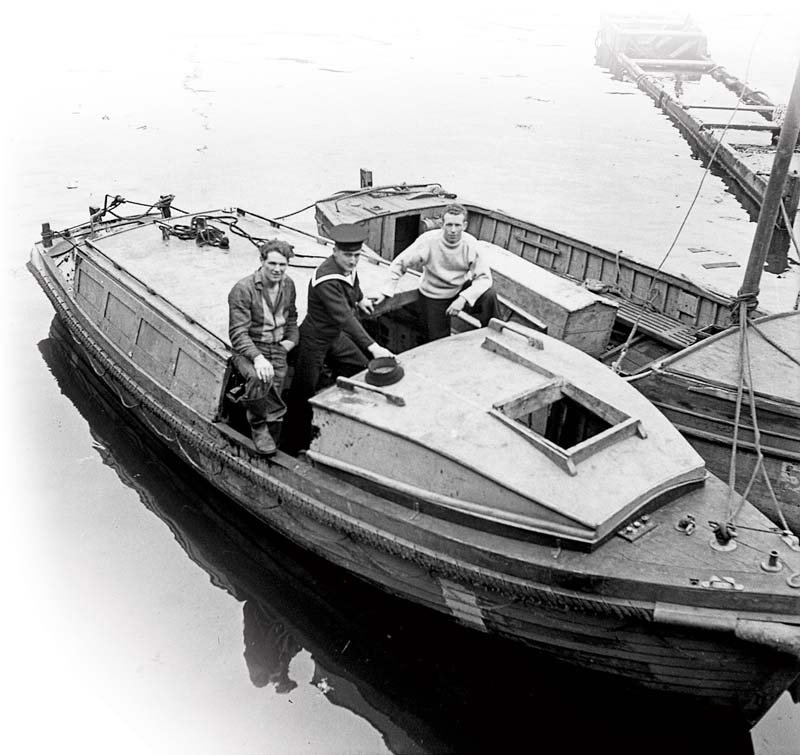While Allied troops were fighting to secure the Normandy beachhead on June 9, 1944, Canadian air and naval forces helped destroy what was left of the German surface fleet

German destroyers Z-24 and T-24 were finally sunk by 404 and 236 squadrons near Le Verdon on Aug. 24. [albumwar2.com]
By June 1944, Hitler’s Kriegsmarine was a shadow of its former self.
Its mighty battleships had all been sunk or bottled-up in distant ports and the U-boat fleet, once so menacing to Allied communications, had been reduced to a mere nuisance by overwhelming air and naval superiority. But the Kriegsmarine was a proud service, and as soon as it learned of the Normandy landings, it threw what resources it had left into the fray.
On the morning of June 6, as Allied troops were pouring ashore in northern France, German Admiral Theodor Krancke ordered the three destroyers of the 8th Destroyer Flotilla, the most powerful remaining German surface warships in Western European waters, to leave their base in Gironde in the Bay of Biscay and head into the English Channel to attack built-up Allied convoys. The flotilla was led by Kapitän zur See Theodor von Bechtolsheim, a gaunt, steely eyed veteran of many destroyer operations.
It was a daunting task made all the more difficult by the fact that Allied cryptographers had long since broken the Kriegsmarine’s Enigma codes. Within an hour of the German ships leaving Gironde, Vice-Admiral Sir Ralph Leatham of Plymouth Command received an Ultra alert.
As the ships approached Brest, they were attacked by Bristol Beaufighters of the Royal Canadian Air Force’s 404 Squadron. The flotilla was forced to put in for repairs until the evening of June 8 when, reinforced by the addition of torpedo boat T-24, it resumed its course.

Bristol Beaufighters of 404 Squadron, RCAF break formation over Scotland. The squadron attacked a German flotilla off Brest, France, in June 1944, forcing it to port. [Flight Lieutenant Bertrand John Henry Daventry/Royal Air Force/IWM/CH-17873]
Plymouth Command continued to follow its movements and dispatched its own surface forces to intercept the German warships. At 1:25 a.m. on June 9, when the German ships were about 50 kilometres northwest of Île de Batz, a small, rocky island off the Brittany Coast, Bechtolsheim spotted shadows to the northeast and turned to investigate. As he peered into the darkness, the moon suddenly broke through the overcast, revealing the familiar silhouettes and camouflage markings of British Tribal-class destroyers. He had stumbled into battle with the Royal Navy’s 10th Destroyer Flotilla.
DeWolf famously carved a notch into Haida’s bridge rail for every enemy ship he sank.
The British Admiralty had organized the 10th Destroyer Flotilla in January 1944 for the express purpose of securing the western approaches to the Channel in anticipation of the Normandy Invasion. By June, it boasted eight destroyers organized into two divisions, the 19th and 20th, led by Commander Basil Jones, a seasoned destroyer commander.
Jones placed his most experienced ships, including his flagship HMS Tartar, in the 19th Division, along with HMS Ashanti and the Canadian ships HMCS Huron and HMCS Haida. The latter was captained by Commander Harry George DeWolf.

Commander Harry DeWolf led HMCS Haida, along with HMCS Huron, in a running gun battle with Z-32, sinking the destroyer off Île de Batz, France, on June 9, 1945. [Herb Nott/DND/LAC/3201279]
A native of Bedford, N.S., DeWolf was a quiet, unassuming man who preferred to let his actions speak for themselves. He was nicknamed “Hard-Over Harry” for the sharp turns he would order when charging into enemy fire, and was deeply respected by his fellow officers for his aggression, tactical skill and the “priceless gift of fortune” when it came to finding targets. He famously carved a notch into Haida’s bridge rail for every enemy ship he sank, a tally that would eventually reach 14.
On this night, DeWolf was more eager than usual to come to grips with the enemy. Just over a month earlier, on the night of April 28-29, Haida and HMCS Athabaskan had encountered T-24 and another German torpedo boat while on patrol in the Channel. The Canadians forced one of the German boats aground but a lucky torpedo from T-24 found and sank Athabaskan. The cries from Athabaskan’s drowning Lieutenant-Commander John Stubbs to “Get away Haida, get clear!” (of the mines and shore batteries) still rang in DeWolf’s ears.
It was the destroyers of the 19th Division that Bechtolsheim spotted in the moonlight in the early morning hours of June 9, 1944.
Jones had deployed his destroyers in a line abreast, a difficult formation to maintain, but one that gave his ships the manoeuvrability to comb incoming torpedoes while still bringing considerable fire to bear on the enemy. The 20th Division followed about three kilometres behind, led by the Polish destroyer ORP Błyskawica, commanded by Captain Konrad Namiesniowski.
At first glance, the Germans appeared to stand little chance against a flotilla twice their size. However, the 8th Destroyer Flotilla was a potent, if motley, force. Two of its ships, Z-24 and Bechtolsheim’s flagship Z-32, were of the German Narvik class and boasted five 5.9-inch guns, a heavy calibre usually found on cruisers. They were also more heavily armoured than their Royal Navy counterparts.
The other destroyer, the smaller and slower ZH-1, was actually a Dutch vessel captured and pressed into the Kriegsmarine following the German conquest of the Netherlands.
Star shells and gun flashes lit up the night sky as the two sides came to blows.
Finally there was T-24, a Type 39 fleet torpedo boat, in actuality a small, highly manoeuvrable destroyer that packed a wallop, as the Canadians had learned from the loss of Athabaskan. The British had learned how deadly German fleet torpedo boats could be the previous October when in another night engagement in Channel waters they lost the cruiser HMS Charybdis and a destroyer to a small force of Type 39s.
Bechtolsheim ordered his ships to turn to port and fire a spread of four torpedoes each. Unknown to the Germans, the British and Canadian ships were equipped with monitoring devices called Headache Units, which allowed them to listen in on the enemy’s radiotelephonic traffic. They could hear the German order to launch torpedoes, and thanks to their flexible formation, avoided the incoming “fish” without changing course.
Star shells and gun flashes lit up the night sky as the two sides came to blows. The battle quickly devolved into a chaotic melee in which commanders on both sides struggled to keep the enemy in their sights and contact with their own ships.
Tartar was the first to strike, landing four hits on Z-32, forcing Bechtolsheim to flee to the northwest. Rather than pursue Z-32, which he knew was unknowingly fleeing straight into the path of the approaching 20th Division, Jones instead joined Ashanti in pounding ZH-1. Thoroughly outgunned, ZH-1 suffered five crippling hits, including one that disabled its radio, before fleeing to the southwest.
It was an auspicious start to what should have been a runaway victory for the Allies. However, inexperience, the innate confusion of a night engagement, and the difficulty in co-ordinating such a large force now began to tell.

Haida’s motor cutter had been used to rescue survivors of HMCS Athabaskan on April 29. [William Sclater/DND/LAC/3211891]
The 20th Division was composed of ships that had joined the 10th Destroyer Flotilla barely a month earlier and commanders who were not as experienced in night fighting. They were also less familiar with Jones’ innovative tactics than ships of the 19th Division.
Namiesniowski had deployed his ships in the more orthodox line ahead formation with Błyskawica in the lead, and all four ships of the 20th Division managed to score quick hits on Z-32.
But when Błyskawica’s Headache operator reported German torpedoes, Namiesniowski ordered smoke to be laid and a turn to starboard. It was a conventional tactic for evading torpedoes but contrary to Jones’ desire that his ships “press on into the enemy” during an attack. The other ships in the division followed Błyskawica and in doing so, lost all contact with the enemy.
Worse yet, the signals officer aboard HMS Javelin, another of the 20th Division’s ships, had inexplicably destroyed his signal book before leaving the harbour, rendering the ship unable to communicate with the rest of the flotilla. Within minutes of the battle being joined, Jones’ numerical advantage had disappeared, leaving the four ships of the 19th Division to face the four ships of the 8th Destroyer Flotilla on their own.
Bechtolsheim could hardly believe his luck. He turned west briefly to try to reform his force, but finding no one, he turned back east. At 1:38 a.m., he came back into contact with Tartar and again Z-32 came under heavy fire that flooded its magazine, destroyed its sick bay and pump room, and disabled a torpedo tube and gun mount.
This time, however, Z-32 scored four hits of its own. Its 5.9-inch shells tore into Tartar’s bridge, superstructure and wheelhouse, sending lethal shrapnel flying in all directions and starting a deadly fire that filled compartments with choking smoke. One officer and two ratings were killed and 12 more, including Jones, were wounded. Communications with the rest of the flotilla was also temporarily cut.
Luckily for Jones, Ashanti spotted Tartar’s gun flashes in the distance and came to the rescue, blasting away at Z-32. Bechtolsheim was able to slink away again, this time under the cover of the dense smoke billowing from Tartar.
As sailors aboard Tartar scurried to put out the fire and restore communications with the rest of the flotilla, ZH-1 suddenly drifted into view. The former Dutch ship lacked the armour of the German Narviks and the lethal pummelling it had taken at the outset of the battle had left it dead in the water. The British ships hit ZH-1 with everything they had, including two torpedoes from Ashanti that ripped off its bow.
To his credit, ZH-1’s commander, Korvettenkäpitan Klaus Barkow kept his guns firing until his crew had laid scuttling charges and the order to abandon ship was given. At 2:35 a.m., the destroyer exploded in a massive blast that could be heard across the Channel. Thirty-nine officers and men, including Barkow, were killed. Another 140 were eventually pulled from the water by a British escort.
While Tartar and Ashanti were engaging with Z-32 and ZH-1, DeWolf and the Canadian ships were chasing Z-24 and T-24 as they attempted to flee to the southwest. Both the German ships laid smoke, but a fire in one of Z-24’s funnels kept it visible to its pursuers. Unfortunately, fierce winds and rain squalls made it difficult for Haida and Huron to accurately train their fire, and although there were many near misses, both ships failed to score a hit.
At 1:50 a.m., the German ships unknowingly entered an Allied minefield and DeWolf, unwilling to risk his ships, wisely altered course. By the time the Canadians had skirted the minefield, they had lost contact with the German ships and a frustrated DeWolf decided to turn back east to where they assumed Jones and the rest of the division would be.
At 2:30 a.m., the Canadians stumbled on a ship that they assumed to be Tartar. “Switch on firing lights,” DeWolf signalled. “Where are you?” The ship signalled back but DeWolf could not make heads or tails of the response. “What is enemy’s position?” he signalled again, but again an incomprehensible answer followed.
Finally at 2:54 a.m., a star shell revealed the mystery ship to be Z-32. The Canadians landed several hits before Z-32 sped off westward and again miraculously evaded certain destruction by disappearing into another Allied minefield.
By now, Z-32 had suffered 25 or 30 hits and was running low on ammunition. But Bechtolsheim was determined to break through to the east. At 4 a.m. he re-established contact with Z-24 and T-24 but was disappointed to learn that they were on their way back to Brest. Realizing that he stood no chance on his own, “with a heavy heart” he decided to call off the mission and focus on returning westward without running into the enemy.
Bechtolsheim was correct to be wary. DeWolf, infuriated at having lost Z-32, doggedly patrolled the edges of the minefield, waiting for the German ship to either emerge or hit a mine. Finally, at 4:44 a.m., his ships spotted Z-32 trying to flee westward and opened fire. Bechtolsheim responded by firing his remaining torpedoes, then turning due south, hoping to take shelter somewhere along the coastline.
This time there was no way DeWolf was going to let the enemy out of his grasp. A furious chase ensued during which the Canadian guns proved deathly accurate. Repeated hits smashed into Z-32 while huge columns of water from near misses soaked the crew on deck. Bechtolsheim could only hope the Canadians would run out of ammunition and give up the chase.
It was not to be. By 5:13 a.m., Z-32 was slowing down fast due to a hit in the turbine room that knocked out its starboard engine power. Only one gun turret remained and the ship’s ammunition stores were exhausted. Realizing he had no chance of escaping his pursuers, Bechtolsheim ordered Z-32 run aground and abandoned on Île de Batz.
DeWolf, seeing that Z-32 was finished, spent another 10 minutes shelling the burning wreck for good measure then turned north to rejoin the flotilla and return to Plymouth where they were welcomed by cheering crowds.
Incredibly, only 32 men were killed aboard Z-32, a testament to the hardy construction of the Narvik class. Bechtolsheim and the rest of the crew managed to escape under heavy Canadian fire and were picked up by a German patrol boat later that morning. Z-24 and T-24 both made it to Brest, but their days were numbered. On Aug. 24, both were destroyed in an air attack by 236 Squadron, RAF, and 404 Squadron, RCAF.

HMCS Athabaskan was sunk by T-24, a German torpedo boat, on April 28-29, 1944; 128 crew, including Lieutenant-Commander John Stubbs, were lost. [Walter W. Pranke/CWM/19900153-001]
Jones and DeWolf were praised for their leadership in what First Sea Lord Sir Andrew Cunningham called “a spirited action.” For the Royal Canadian Navy in particular, having spent most of the war performing dangerous but unglamorous convoy duties, the dashing victory came as refreshing and galvanizing news.
In the weeks and months following D-Day, Haida and DeWolf won further laurels finishing off what was left of the Kriegsmarine in Western Europe, including sinking a U-boat in the Channel and decimating a German convoy in the Bay of Biscay. DeWolf would finish the war as one of Canada’s most celebrated sailors and eventually become Canada’s Chief of the Naval Staff.
Haida finished the war with five battle honours and the nickname “the fightingest ship in the Canadian navy.” The ship saw further service in Korea, the North Atlantic and West Indies before being saved from the scrapheap to become a National Historic Site now berthed in Hamilton, Ont. In 2006, the ship was “twinned” with its 10th Destroyer Flotilla companion Błyskawica, which also survives as a museum ship in Gdynia, Poland.
Advertisement





















